#Objective Basis for Belief
Explore tagged Tumblr posts
Text
Daisuke’s Death and the Invisible Abuse of “Privileged” Children
tw: extensive discussions of child emotional abuse
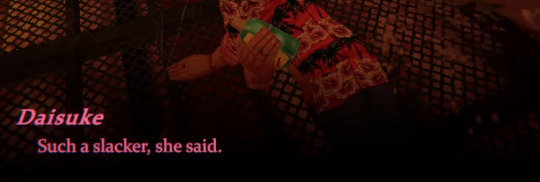
Another mouthwashing text analysis before I post any polished art? Shocker. But I really really appreciate the reception on my Swansea post, especially as a new account! This Daisuke-centric analysis is gonna be a quick one (< this was a lie. long read ahead!) but he is a character who resonates deeply personally with me as a victim of childhood abuse that resembled some of his experiences. I do plan on doing a larger analysis of his character, but the abridged version necessary for this piece goes as follows:
Daisuke’s treatment in the narrative—both his implied home life and Jimmy’s taking advantage of him to go into the vent—is another one of this game’s excellent portrayals of normalized (and thus invisibilized) abuse. Children are often cited as one of the most vulnerable classes of people, if not the most vulnerable (I acknowledge that Daisuke is not a child, but Mouthwashing implies that this narrative of his inadequacy has persisted throughout his upbringing and, to this day, he is dictated tasks and lacks independence, treated like a dependent. His youth is also an undisputed feature of his character and, most importantly, the cast treats him like a kid). Children’s dependency on adults and our willingness as a society to accept that the adults in their lives provide the most objective perspective on these young people renders them particularly prone to abuse easily swept under the rug or “justified” by wardens who possess the power to dictate the narrative. Jimmy’s engagement with Daisuke is an extension of the latter’s vulnerability. The co-pilot’s assertion that “he’ll be fine (…) mommy and daddy have him covered” at the birthday party represents a deference to Daisuke’s parents as adequate caretakers who will ensure his longevity and comfort on the basis of their wealth. And we know that Daisuke’s parents think the same—the Q&As reveal that they believe they are doing the best to secure their son a good future. However, the same Q&As indicate that they don’t actually engage with or understand Daisuke’s interests and that their approach to parenting him is entirely understood through their personal beliefs, not those of their son. And Daisuke clearly carries that quite close to his heart. He seems to struggle with identity and acceptance, seeking validation in the form of praise. Daisuke is defined through what he can do for others and not what he independently brings to the table, because that has never mattered where he grew up. The consequences of his parents’ failure to meet his emotional needs ultimately conditioned Daisuke to be perfectly available to be taken advantage of in a corporate setting defined by capitalist attitudes and hierarchies.
While it’s not concrete to say that Daisuke grew up in an emotionally abusive household, it is most important that we cannot dismiss the possibility and that his behavior as the outcome of some obvious degree of neglect is well-aligned with this theory. Moreover, the young man who comes out of that household is easily targeted by Jimmy’s abusive tendencies as a direct result of what he internalizes growing up. Daisuke is apparently financially well-off (contextually we can’t be sure if Daisuke’s family is upper class, middle class, or somewhere in between), and with that comes privilege. Even the way he packs—multiple personalized outfits, entertainment devices, etc—reveal that he’s used to certain comforts and hasn’t yet acclimated to the harsh expectations of companies like the Pony Express. But, especially where young people are concerned, it is all too easy to allow this privilege to act as a curtain between abuse and the outside world. We can acknowledge the privilege that he undoubtedly enjoys and also recognize that it benefits his parents much more than it benefits him as a young person.
Emotional abuse is complex and extremely damaging and Daisuke *does* show symptoms of at least being constantly verbally accosted and emotionally neglected by his parents to the point of permanently warping his sense of self. It also generated his overreliance on authority figures to tell him how to keep himself safe in their world. His mother apparently insulted him to his face (“such a slacker, she said”, and being reprimanded for being too talkative [from the Daisuke teaser]), and a lot of his negative self talk (“total screw-up”, “fuck up”, etc) is reminiscent of how people define themselves by parroting what they are called after internalizing consistent externally-imposed definitions of their identity. While these are not surefire indicators of abuse and I am not willing to diagnose a situation as abusive purely predicated on these factors, the behaviors Daisuke exhibits as a result share many commonalities with those of victims of childhood abuse. In fact, just about every time Daisuke speaks about himself in Mouthwashing, he mentions his failures and his work. It’s not lost on me that the teaser for the whole character is him pondering his mother and how she might not recognize him if he isn’t noisy and obnoxious. He personally puts a lot of stock in their assessment of him as lazy and annoying, but nevertheless tries to accomplish learning through the internship. Furthermore, Daisuke takes on a lot of his mother’s pain, hoping she doesn’t blame herself for the negative things that happen to him (even though in the same scene he reveals that she’s the reason he’s on the stranded Tulpar at all), indicating that he has taken responsibility for the feelings of people in his life even when those people are not his to care for and even bear responsibility for his pain.
Now in young adulthood, Daisuke rarely seems to have any sense of self beyond his parents and his work aside from one-off quips about baseball and babes. It suggests that he has always had to prioritize his parents’ desires growing up to avoid being treated unfairly and even cruelly, stunting his self-discovery. In abusive situations, your understanding of safety and your pursuit thereof are radically impacted and we see this manifest in Daisuke’s continuing willingness to accept those in command as the pinnacle of safety over what one might consider logical, personal acts of self-preservation. He equates safety with obedience, and I contend that that equivalence suggests a lot about how his parents reprimanded deviance from their plans. And not to be that guy, but it is kind of outright cruel to dump your utterly inexperienced teenager-to-early-20-something on a 1 year, no contact, unsafe space voyage in a failing industry knowing that he doesn’t have the necessary skillset yet. That’s what his parents do when they aren’t satisfied with his progress, and it’s intense and disproportionate and alarming! Especially for the dependent! They toss him into the deep end of the corporate machine and insist he learns to swim in such an oppressive, stifling atmosphere. It’s no surprise that he drowns, especially when he himself can’t recognize this as an unrealistic expectation and tackles it with everything he’s got because his parents are theoretically always right about what he needs. I don’t think it’s a stretch to say that normalized emotional abuse from the home and how it maps onto a victim’s adult life is a topic Mouthwashing would endeavor to touch on, because visibilizing invisible abuses of power in heteropatriarchal capitalist schemes is arguably the central undertaking of the game.
I don’t think Daisuke has evil parents or anything, rather that what we accept as “good parenting” and “good mentorship” is often negligent with regard to emotional needs and can easily become a source of heavy trauma for the children and mentees if that emotional aspect is stretched too thin in the pursuit of success. Not all abuse is intentional, and the dev Q&As imply that Daisuke’s parents thought they were sincerely investing in his future. They cared, just not in the best way for his wellbeing. Because capitalism emphasizes the individualistic pursuit of success above all else, it’s no wonder that a parent would think that the best thing they can give their kid is an avenue to prosper financially. But in doing so, Daisuke’s parents deny him the opportunity to define himself, to experience agency, and to build up confidence. Effectively, they create a young man so vulnerable to abuse by higher-ups (a manifestation of abuse that is often intentional at the systemic level) that he decides to climb into that vent at Jimmy’s discretion under the pretense that he will make somebody proud. Because that’s how Daisuke has been raised to understand himself and his place—the presumed screw-up boy as a default, making you proud by doing the right thing, who has learned to pursue that achievement to avoid the condescension and disproportionate backlash (e.g. the internship itself) that comes with failure. Everything circles back to his parents’ expectations that he makes for a good worker. When the cocktail knocks Swansea out, Daisuke makes an offhand comment about getting a bad reference—even in the most dire of circumstances, he can’t stop thinking about their capitalistic expectations for his “good” future.
I find that Daisuke really is such a good subtle portrayal of how parents with resources can get away with emotionally stunting their children because we perceive their ability to put a roof over their heads, food on their plate, etc as adequate parenting and even a privilege for the child when it should be the bare minimum. Jimmy certainly buys into it, and even some of the fandom parrots that, really and truly believing Daisuke is some good-for-nothing kid who doesn’t try hard when all we see is him working, including climbing into the vents to try and help despite not being assigned the work (foam scene, not his death). I find this reception shows how inclined we are to accept those narratives of the privileged child’s inadequacy before we address the parent for not fulfilling a child’s emotional needs, which are just as important if not more than the material.
To wrap this up with a quick discussion of the symbolism of his death in the context of the emotional abuse of children (which is the reason I made this whole post but I can’t talk about this guy without going off): Daisuke getting so badly injured trying to do what’s right is a very physical manifestation of the suffering he was already going through. It is the pain of constantly people-pleasing and of holding it all in when he’s lashed out at. He gets injured at all in the pursuit of appeasing Jimmy and (theoretically) Swansea, both of whom he blindly trusts despite how they treat him because he has always been expected to just adhere to the adults with authority in his life. Being talked down to by them is not new and has never been a reason to question their judgement. Daisuke sees this as a product of his own inadequacy as implied by other people, and not of external cruelty. He was raised not to question the system for fear of repercussions.
Jimmy is perfectly situated to coerce him into a dangerous situation because Daisuke has never been taught to say no. The safest option for a scared child is to trust their mentors, and an adult Daisuke does just that. Even Swansea’s teachings of safety are dismantled by Jimmy’s tactical use of captainhood to break the camel’s back. Authority. Daisuke must always listen to authority. Jimmy knows the vent isn’t safe. Swansea tells him directly and he observes the foam incident (if from a distance). For as much as he acts like he cares about taking responsibility for Daisuke’s safety, his individualistic pursuit of “fixing” things manifests in Jimmy again taking advantage of a vulnerable person on the ship. Jimmy doesn’t reconcile Daisuke’s eagerness to help with lessons on safety like Swansea does, but rather uses it only when it benefits him. Daisuke is taught by his upbringing to accept this kind of treatment—for safety, defer to the leader in the room even if it hurts and you don’t want to do it (just like he didn’t want to be on the Tulpar in the first place).
Then, once the intern is out of the vent and mortally wounded, Jimmy applies the mouthwash (a product to be sold, hauled in the interest of the corporation) to “help” sanitize the wounds. But the sugar content negates medical utility and only worsens the pain. We can interpret this as the application of material privilege, “sweetness”, that wasn’t actually any help at all to solve the deep wounds left by emotional pains. Mouthwash rids you of the bad taste but doesn’t kill all the underlying germs. One could argue further that in this scene, the mouthwash is specifically representative of the Pony Express internship: a rare stepping stone in the corporate hustle gained through privilege and presented as a boon. Like the mouthwash, the internship is imposed on Daisuke to try and “help” him succeed and be better, but it only elevates the pain by irritating the wounds and ends in his agonizing demise. However, this fine-tuned comparison isn’t necessary to my point. I find the broad implications of the mouthwash as an antiseptic immensely representative of parents and caretakers who don’t seem abusive to the outside world but who are actually subversively hurting their children and ultimately conditioning them to be victimized by capitalist attitudes. Our deference to material comforts and corporate opportunities as indicators of wellness renders us blind to where caretakers fail to address the emotional needs of young people. At the end of the day, Daisuke is still killed by the values his parents have instilled in him. It’s always the “captain’s” (literal or figurative) orders that seal the deal and cut off any of his autonomous doubt or dictation (for example, his desire to listen to Swansea and not go in the vent). His parents’ symbolic and saccharine gestures mean very little in the scheme of creating a person who can survive the pressures of the “real world” when malicious actors (JIMMY.) and the capitalist enterprise as a whole bear down on the cracks of an emotionally taxing youth.

A/N: Maybe I’m thinking about all of this too hard, but the beauty of Mouthwashing is that I’m never quite sure that’s the case as this game feels so deliberate. Based on my experiences, I’ve long found this to be a really important analysis to posit and I finally had the time to put it into words. I feel like Daisuke as a symbol is often overlooked by the fandom. He’s enjoyed, yes, but not really broken down like the others are. That diminishing of his importance and his feelings about the situation also feels like a symptom of his age. But that’s neither here nor there—like I said, I believe I could do a much more in-depth analysis of Daisuke as a victim of subtle abuse but this will have to do for now. A lot of my major points have been made, anyway! Perhaps video format would be best for something longer-form. 🌺
#.txt 🌊#mouthwashing#mouthwashing analysis#daisuke mouthwashing#not tagging Jimmy but he’s mentioned here#mouthwashing game#oh my god this is so long I’m so sorry#I have an actual class essay to write but here’s daisuke mouthwashing I guess
558 notes
·
View notes
Text
tbh I don’t think I’ll ever really forgive the trans movement for indoctrinating so many people into the belief that women speaking about our sex-based oppression is “terfy” and shouldn’t be allowed and any woman who does it wants to genocide trans people. even if they back off of this stance, the damage is done.
me saying “women are oppressed on basis of sex, not gender identity, and we cannot identify out of that oppression” does not mean I think it’s okay to kill or hurt trans people. it does not mean that I agree with right-wingers when they say gender non-conformity is destroying civilization. It does not mean that I am going to vote for politicians who think all gay people/gender non-conforming people are groomers.
it literally just means you cannot change your biological sex (which was never a controversial statement, even among trans people, up until like 5 years ago) and females should have special protections and spaces since we are constantly being preyed upon by males who see us as subhuman sex objects. that doesn’t mean I think all trans people are predators, it means that enough males are predatory toward women that we deserve to have spaces away from them (especially spaces where we’ll be not fully clothed).
we deserve to be able to talk about female-specific oppression without being told we’re evil genocidal nazis. and the fact that they constantly have to misrepresent what our actual beliefs are tells me they know we’re right and it scares them.
3K notes
·
View notes
Text
since atheism and the new Pope are the topics du jour I'd like to encourage nuanced thinking:
we should all be working to understand and resist the structural forces of racism, homophobia, sexism, xenophobia, and settler-colonialism to which the Catholic Church and many other religious orgs are complicit in. Human spirituality itself is not your enemy.
Abolitionist work requires solidarity and joy in community, and many of the strongest community networks among marginalized people are found in faith groups. At some point, you will have to wrestle with these contradictions and work alongside people whose belief in a higher power is the basis for their abolitionism. Differences of opinion such as these must not override your love for your fellow person, your commitment to justice.
P.S. — if your atheism is based in "science", "objectivity", and/or "rationalism", you should also be working to understand how these human knowledge systems are also interwoven with the threads of oppression.
191 notes
·
View notes
Text
Hello everyone 🫶❤️
I hope everyone looks at our team and supports us🍉💔
Hand to Hand team overview:
We are a youth volunteer team established in Gaza City - Khan Younis Governorate, including an elite of young men and women university graduates, who gathered under one umbrella to serve our community and overcome the challenges faced by the displaced in the Al-Mowasi area and displacement camps. We started from a deep belief that the spirit of volunteering is not just an effort, but a lifestyle that reflects our humanity and strengthens our belonging.

Our message:
We aim to help those burdened by crises, and we aspire to be a torch of hope that alleviates the suffering of families and children through various programs and targeted initiatives. We not only provide services, but seek to build strong human bonds based on love, compassion, and mutual respect.
Our objectives:
Psychosocial support: Because the good word may be stronger than all solutions, we organise psychosocial support sessions to mitigate the negative psychological effects of crises.
Recreational activities: We believe that entertainment is a right for everyone, so we create an environment of joy through events and open days that give children moments of happiness.
Health education: Health is the basis of a decent life, so we offer workshops and awareness programs that contribute to raising the level of health awareness for families.
Workshops and development: We work to empower young people and women through development training workshops that contribute to enhancing their abilities and improving their daily lives.
Community Initiatives: We launch various humanitarian initiatives, from providing basic needs to needy families to charitable projects that alleviate their suffering.


Our vision:
To be an inspiring model for other youth initiatives, and to leave a lasting positive impact on our society, where volunteering becomes an approach that everyone is easy on.
Our invitation:
We believe that one hand does not clap, and that real change begins when we unite to achieve a noble goal. Therefore, we invite all those who share this faith to join us, because together we are “hand in hand making change”, and together we are re-shaping hope.

Follow us on our pages on social media sites to see our latest events and participate in our upcoming initiatives, because goodness begins with a step... Let's go together.
To be an inspiring model for other youth initiatives, and to leave a lasting positive impact on our society, where volunteering becomes an approach that everyone is easy on.
Instagram:hand.to.hand.team
Our invitation:
We believe that one hand does not clap, and that real change begins when we unite to achieve a noble goal. Therefore, we invite all those who share this faith to join us, because together we are “hand in hand making change”, and together we are re-shaping hope
Follow us on our pages on social media sites to see our latest events and participate in our upcoming initiatives, because goodness begins with a step... Let's go together❤️🩹


232 notes
·
View notes
Text
One of permaculture's earliest missteps was its belief that we should all become small-time capitalists in the service of the movement. This has led to a proliferation of permaculture-related small businesses—YouTube channels, personal brands, conferences, etc. I have no objection to this as a matter of survival; everyone has to make money somehow under the relentless demands of capitalism. But relying on businesses to do the work of evangelizing has essentially turned permaculture into a consumer trend, rather than a movement. A movement is not a stack of books, an endless series of Kickstarters, and a bunch of social media stars. A movement is a collective attempt to change society. Operating as businesses and personal brands makes the "collective" part impossible since those are necessarily individualistic ventures, and it also greatly limits what kinds of change can be made. We cannot move beyond capitalism—which is greatly accelerating the destruction of life on Earth—by being capitalists. We cannot spread permaculture by undermining the condition for our own survival. If permaculture is to become a movement rather than a consumer tchotchke, it will need to stop functioning as a constellation of small businesses and start building collective power on the basis of solidarity. This is called organizing, and it means working together to fight for our shared interests, as permaculturists and as humans living on an imperiled planet.
252 notes
·
View notes
Text
I think the big problem with a lot of post-modern concepts of morality is that so much of it (e.g. gender theory) is ultimately based on the assumed premise that "not hurting others" is the end goal of all moral philosophy and social behavior.
Conflict with these theories and concepts primarily stems from a rejection of this fundamental premise. "Not hurting others" is a highly subjective goal that is difficult to define or qualify, since it requires an agreed understanding of everything that constitutes "hurt". But it's highly idiosyncratic by nature because it's such an individual response, so morality then becomes an incredibly difficult dance of knowing every individual person's tiniest preferences and sensitivities in order to be a good person. When hurt is held as the ultimate evil, there is never a reasonable justification for not validating sensitivities. If what you know that what you think, say, or do hurts people, you're a bad person - full stop. (Although it usually comes with the unspoken understanding that this only applies to certain groups of people you have arbitrarily determined are not problematic, i.e. it's okay if your beliefs hurt bigoted people).
And yet it also raises the major moral conundrum of self-inflicted pain; if you believe suicide to be "hurt" and therefore immoral, but the person in question does not see it as such, is it morally correct to let them commit suicide or to stop them? If we admit that not all perceptions of hurt are equally valid, then we must question how we distinguish the legitimate from the illegitimate. And if we consider that self-inflicted hurt is still bad even when consented, the oft-cited counter-argument, "Let people do what they want as long as it's not hurting others" falls hopelessly flat - because what if the 'other' they are hurting are themselves? Who gets to determine what constitutes self-harm? "Hurt" is such a highly subjective perception, and everyone will argue that their perception is the moral standard, while arguing that everyone else is unfairly projecting their own standards for "hurt" on others (thereby causing hurt in the process). It's chaos.
This is why basing an entire moral philosophy off "not hurting others" is bananas. It's one thing to hold that philosophy for yourself, to determine what you think is the true standard for "hurt" and avoid that as much as possible in your choices. It's another to assume that everyone agrees with your assumed premise that avoiding hurt is the basis for all moral decisions.
There have been multiple times I've been in an argument with someone over a perceived injustice, and it's fascinating how often their point ultimately boils down to "it's mean to make people feel bad". But that's not what I base my morality on. I base morality on what I perceive to be objectively true, and although I never wish to make others feel hurt, others' subjective emotional response to confrontations with moral truth is not my responsibility.
564 notes
·
View notes
Text
This came to me earlier, and now I am utterly obsessed: While it was clear to me that Odysseus stabbing Poseidon wasn't any kind of Vengeance, there was one act of Vengeance after all, even if inadvertent—it was Odysseus disproving Poseidon's "Ruthlessness is mercy upon ourselves" belief right in front of his very eyes. With him as the subject, even.
Think about it—the fact that Poseidon remained ruthless and insisted on punishing Odysseus was the only reason he got stabbed repeatedly. If Poseidon had been merciful, if he had accepted Odysseus' offer of forgiveness, he would've been fine. His own ruthlessness backfired so hard on him this time that I am sincerely hoping it haunts him forever.
I am actually utterly obsessed with Poseidon thinking back to Odysseus "Maybe you could learn to forgive?" on a daily, no an hourly basis. I cannot and will not lie to you that is unironically my favorite moment in the whole Vengeance saga just because of what it says about both the characters—about Odysseus for offering and Poseidon for declining (and also because Odysseus sings it in Poseidon's own motif which is just absolutely brilliant.) And this makes me love it even more.
Poseidon was going to decline, we all know that. I don't think anyone watching—even Odysseus, probably—expected him to accept. But then I'm picturing him lying there, bleeding into the stone, and, against his will, wondering whether maybe he should have. Maybe if he had, he wouldn't be in pain. Maybe if he had not killed Odysseus' fleet ten years ago, he wouldn't be in pain either. Maybe this one time ruthlessness wasn't mercy upon himself—maybe this time, his one grand belief was wrong. Maybe ... it was always wrong.
Obviously, he would never admit to these thoughts, he would slap himself for having them one second later. But I simply need this self-proclaimed god of ruthlessness to be utterly haunted by that and question whether he made the right choice or no—whether he's even lived by the correct philosophy all his immortal life—and no matter what, be too stubborn to admit he was wrong.
He's trying to pretend like nothing changed, but the thoughts still remain. They pester him. They won't leave him alone. Especially every time someone—anyone—is kind to him for whatever reason, they come crashing back into him and they won't leave.
"What if my own ruthlessness hurt me that time?"
"What if ruthlessness isn't mercy upon ourselves after all?"
"What if I'm wrong?"
"What if I have always been wrong?"
The most dreadful thoughts imaginable to a god as proud and stubborn and old as Poseidon, but they're there now and he can't do anything about them. You all don't understand how much I NEED this god to jolt up in his bed at 3 am after having a dream or nightmare about something related to one of his many ruthless deeds (maybe even sinking Odysseus' fleet) and go "BUT WHAT IF I HAD LEARNED TO FORGIVE?? WHAT IF I STILL COULD??" only to immediately slap himself for it because that's absolutely ridiculous.
He is left to watch this belief shatter before his very eyes as he's clinging to the remains of it desperately, trying to keep it all from crumbling. Not because he genuinely believes he's right anymore, but because he simply cannot imagine ... does not know how to live by any other philosophy.
No matter whether it's objectively correct or not, it's the very thing that defines him. The thing he's known for. He has built his entire image around this, he cannot give it up no matter what ... at least not quickly or without help.
But as much he would seek to deny it, his core belief has now been proven wrong; he has actually lived through an instance where it was wrong, and he can do nothing to erase those memories or conclusions from his mind no matter how much he yearns to go back to simpler times.
And that was the real Vengeance, guys—possibly the biggest, most painful existential crisis of Poseidon's immortal life. I rest my case.
Although before I disappear back into the void I simply must give a shout out to @o3o-lapd-o3o (this came to me during a conversation in one of their comment sections for the glorious Friends In Higher Places AU, which is quite possibly my favorite piece of EPIC fan content that exists ...)
#poseidon epic#epic the musical#epic musical#epic the vengeance saga#epic odysseus#poseidon#jorge rivera herrans#i have never believed in ruthlessness is mercy#but thank you so much odysseus for proving me right#with ruthlessness of your own#how very poetic#poseidon having an existential crisis over being too stubborn for redemption is sth i didnt know i needed#i wanna believe he gets there eventually#a few centuries later#odysseus has no idea what he did btw#he stabbed poseidon and that was that#he probably didnt think he could so much as make him question this#someone somewhere out there eventually notices maybe#HAVE I MENTIONED HOW OBSESSED I AM WITH ODYSSEUS' “MAYBE YOU COULD LEARN TO FORGIVE?” YET#because I AM#that god killed your whole fleet#thunder saga!odysseus would not have offered this#i love the subtle hints at odysseus' positive development in this saga almost more than anything#the only thing I don't love about them is that they're so subtle a majority of people don't notice them#friends in higher places au?#am i allowed to tag this as that ouo#epicssay
181 notes
·
View notes
Text
In-Depth Analysis On All The DR Characters Because What, Are You Gonna Try And Stop Me? Who Are You, My Mom? Yeah, I Didn't Think So- Part 1: Kiyotaka Ishimaru
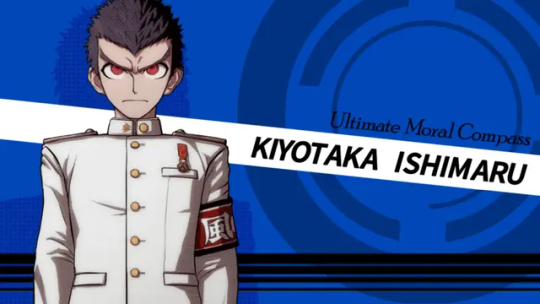
Yes, I'm aware the title is ungodly long, it's called comedy. Behold, a series inspired by my overwhelming hubris! Despite my better judgement, I love this series and (almost) every single one of its characters, so I decided to do this little series of posts on the side, just cuz!
So part 1 of like, 88 I think?, going through the characters from THH, DR 0, SDR2, UDG, DR3, and DRV3 with as much objectivity as possible, analyzing their character using only canon material from the games/anime/novel/canon adaptation they're present in. So sit back and enjoy while I go feral! Or just scroll, if you aren't interested. Whatever works for you.
*Editing note, June 29, 2025: Reformatted things like headers & quotes for cleanup. No information or conclusions have been changed.
Part 1- Character Design
Kiyotaka Ishimaru is depicted as a very aggressive honors student, and is shown as such through his very expressive facial features and his choice of clothing. He has large eyebrows and big eyes, and is given a uniform meant to make him look more like a soldier, reflecting his rigid dedication to the rules and his ethics. This uniform also includes an armband meant to signify his authority within the class as Hall Monitor and as the unofficial class rep. His sprites are very animated, with big gestures using his arm(s) and his mouth often wide open, whether in a wide smile or while yelling. This makes him one of the more expressive characters in THH specifically, as most of those characters are pretty restrained on a day-to-day basis and only become more exaggerated when put under high levels of stress.

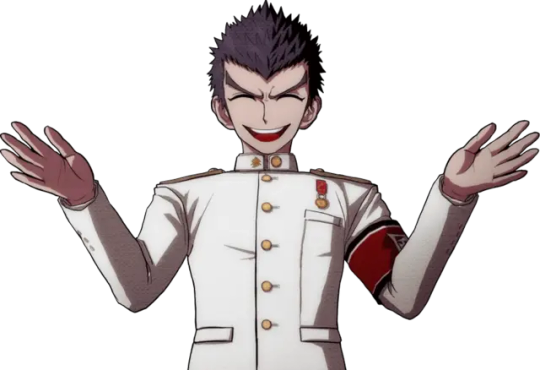
Something interesting about Taka is that his talent changes from the original Japanese to the English translation. His official talent is the SHSL Public Morals Committee Member, meaning his original talent was that of discipline and social order. This was translated to Ultimate Moral Compass in English, as most western schools don't have a Public Morals Committee. This change in translation unintentionally shifted the perception of his talent from discipline to morality. This change in distinction has had a bit of a negative impact on the Western perception of his character, as rather than appearing to impose order on the other students, it instead appears at the beginning as though we, the audience, are supposed to view him as a beacon of morality. We're not.
Part 2- Character Introduction
Taka is one of the first characters to actually speak to Makoto directly, berating him for being late on the first day of school, despite the fact that he and everyone else had experienced a strange warping of memory. He also goes on to interrupt your first conversation with Sayaka, stating that their time is being wasted by 'ridiculous back-and-forth'. Despite this, when it's his turn to introduce himself to Makoto, he goes off on a tangent about how cool Makoto's name is. He's described by Makoto as a 'flawless honors student' and is most publicly known for his work on his local Public Morals Committee. He believes in putting 'every ounce of effort' into living, and imposes this belief on those he interacts with, something Makoto finds irritating.
"This guy is... kind of annoying." -Makoto Naegi, prologue
So in short, Taka's first impression on the player is that he's a mildly obsessive honors kid, and a bit of a hypocrite that isn't fully aware of his own presence or the effect it has on the rest of the cast. The game goes on to use this lack of social awareness as a source of comedy, as he takes Monokuma's initial greeting as Headmaster fully at face value. He struggles to grasp the concept of the killing game at first, opening the discussion upon Monokuma's departure from the welcome ceremony with dialogue that sounds like it was pulled from a customer feedback survey.
"So guys, how would you define what we just experienced?" -Kiyotaka Ishimaru, prologue
He's not a malicious or hateful figure; he wants to work with the class but isn't quite sure how to.
Part 3- Early-Game Events
The game spends the early-game establishing Taka's more negative traits. He's shown to be inobservant and wrapped up in his own ideals and need to command authority to even notice Kyoko is missing and, upon being informed of her disappearance, cares more about her punctuality than her safety.
"Not only is [Kyoko] late, she didn't tell anyone she would be late! A most unbecoming personality trait..." -Kiyotaka Ishimaru, ch 1
He's also established as hypocritical once again, and a bit egotistical, as he has trouble fathoming the others' lack of discoveries but overinflates the importance of his own.
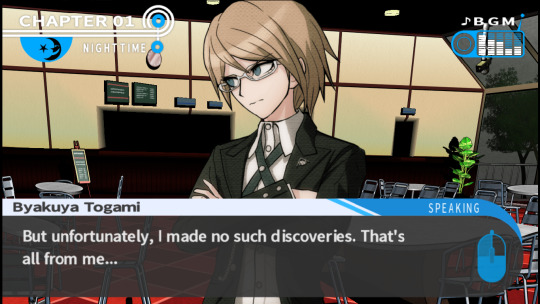
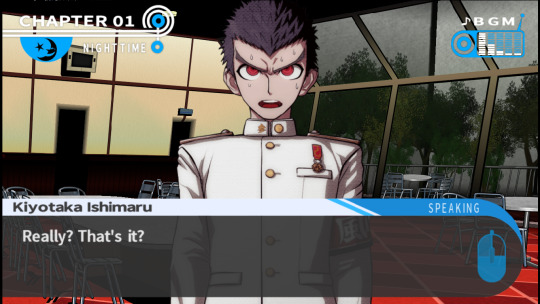
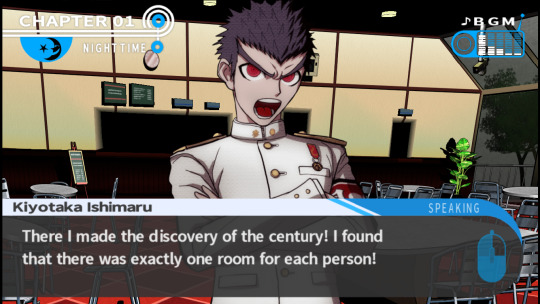
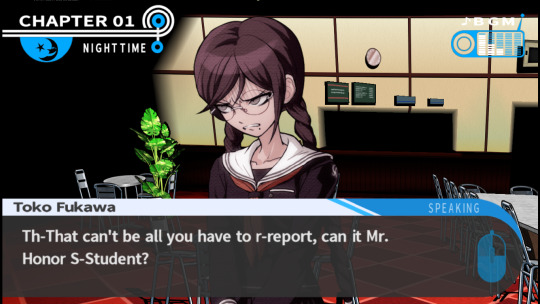
He then goes on to agree to Celeste's suggested nighttime rule for all the boys in the class, without letting them speak for themselves. While ultimately, no one has a problem with the rule, this is the first real instance of him doing something that, on paper, is beneficial to the group, but without considering how the others actually feel about it.
Taka doesn't show up in-story again until the day of the motive, when he goes around to the entire class demanding that they will now all have breakfast together every morning after the morning announcement. Although this is a good idea, allowing for everyone to bond and creating a morning headcount, he makes this decision for the entirety of the group. Leon and Makoto both complain about this if you speak to Leon outside the cafeteria, but ultimately go along with it because they don't want Taka to continue bugging them about it. So we can see that his efforts are perceived negatively by his classmates and go unappreciated.
Already we've seen Taka act overbearing and commanding over and over, inadvertently separating himself from the majority of his peers. He's direct and to the point, forming the breakfast meetings expressly to 'become friends and build trust' with the rest of the class. So we can see in no uncertain terms that he wants to befriend his classmates, but that his lack of social skills leads him to fail at every turn. He doesn't ask the class to join him for breakfast, he tells them. The strategy he employs doesn't leave room for choice, and ends up building resentment from his classmates.
It's not until the first body is discovered and the rules of the class trial are revealed that reality fully seems to set in for Taka. He, along with everyone else, are given the rules of a game they don't really want to play- that should they fail in the trial, all of them will be killed. And it sends Taka to a breakthrough- that some regulations can be harmful to those they're imposed upon.
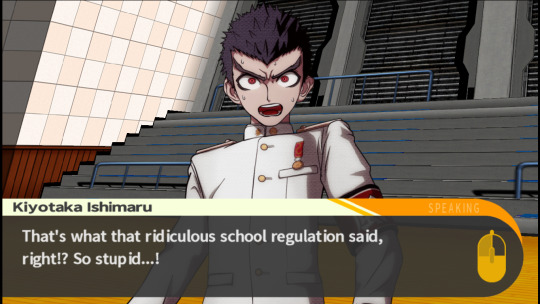
There's now a shift in his actions- he's still trying to push for the class to follow the rules he's set, yes, but there's a newfound urgency to them. When Byakuya disappears in chapter 2, his concern has shifted from punctuality to his classmate's safety. He's the one to lead the search for Byakuya when he doesn't answer. Despite all his harshness, we can see that his strictness now comes from a place of genuine concern for the people around him, a direct parallel to earlier in the game when Kyoko went missing.
"I'd like to think so. But I'm worried something might have happened to him." -Kiyotaka Ishimaru, ch 2
This growth of character, though not focused on, is undoubtedly present. The dedication he has to his discipline and his ego are still fully intact, but now that dedication has moved beyond just order. It's an act of protection, for him and everyone else. The invisible threat of death has become all too visible with Sayaka's absence from their last breakfast meeting. If he can keep track of everyone, then he'll know they're still alive. He can prevent another murder. It imposes upon him the responsibility of the leadership he craves.
Part 4- Relationship(s)
Unincluding if the player actively seeks him out through FTEs, Taka only ever develops a real relationship with one character of the other fourteen in-game, though he does have some important dynamics with others. We'll continue moving in chronological order.
4.1- Ishimondo (these bitches gay?)
Throughout the game, whenever Taka is saying or doing something stupid, Mondo is typically the one to call him out on it or shut him down. While this doesn't start to take real shape until chapter 2, it is visible here and there in the early game.
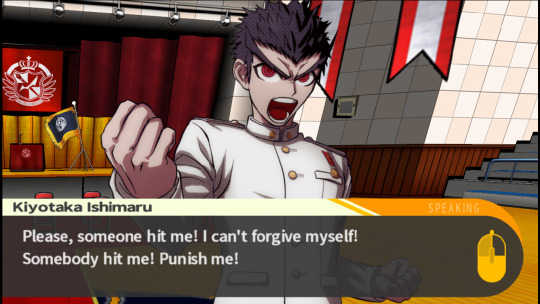
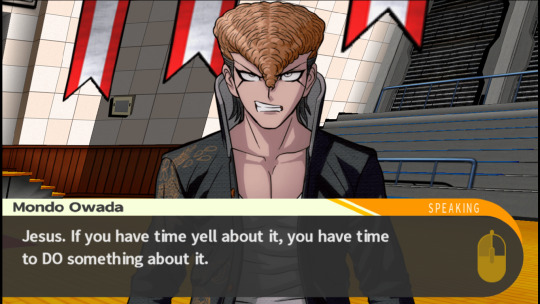
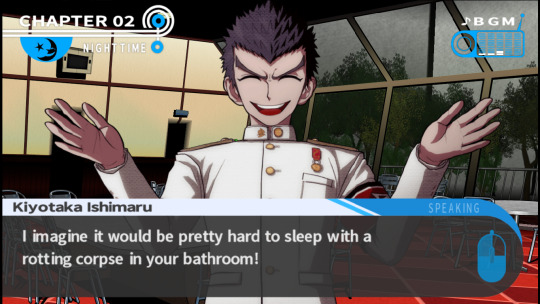
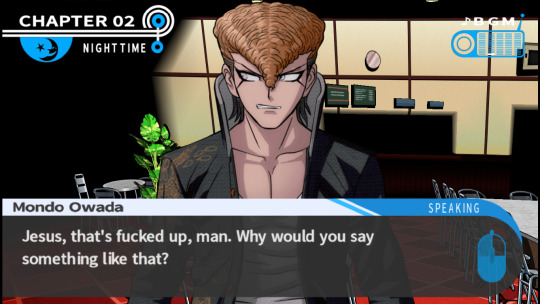
But their connection doesn't really start to take focus until chapter 2, as Taka's failings as leader and Mondo's constant correcting him puts them at odds. Mondo's attitude is the antithesis of Taka's, living a life of complete risk and impulsiveness, yet has a matching level of energy, and despite being more intimidating on a surface level, he's able to actually befriend characters like Chihiro, Hina, and Sakura, while Taka's left on the out. One of the best examples of this is found not in the game, but in the stageplay adaptation, where both characters attempt to help Chihiro feel better about her weakness in the daily life segment.
When Byakuya starts mocking Chihiro for her fear, Mondo threatens him, and insists that Chihiro's weakness doesn't matter because she's a woman. But when this makes her upset and Sakuraoi call him out on it, he offers to help Chihiro train as an apology, acknowledging that his behavior was irrational. But when Taka tries to give her advice by telling her not to be weak anymore and is told to be reasonable, he can only insist that Mondo's words don't matter anyway.
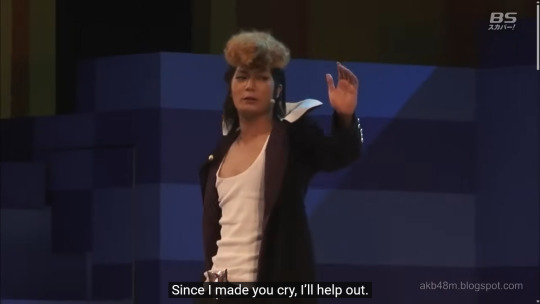
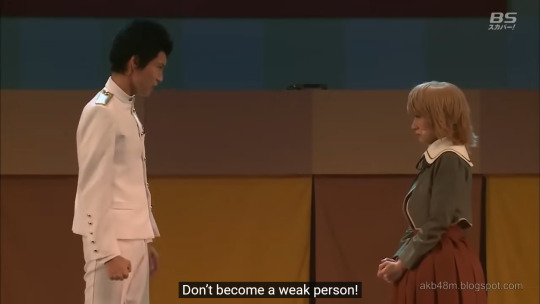
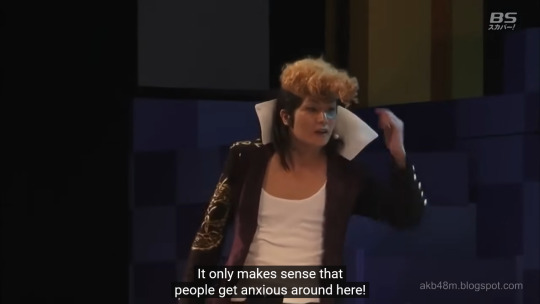
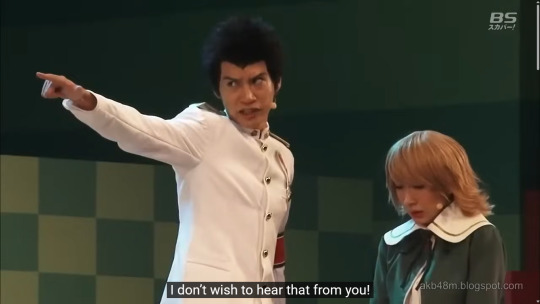
In the game itself, Taka's barely present for this exchange, as it chooses instead to focus on Chimondo's relationship. Regardless, the animosity between Mondo and Taka is still made very clear in-game.
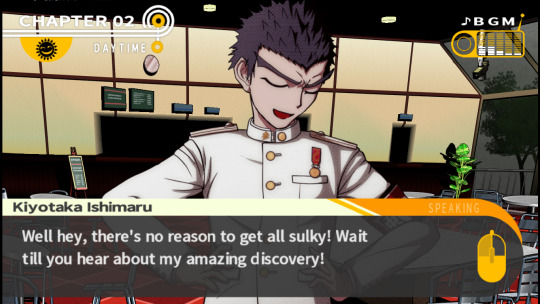
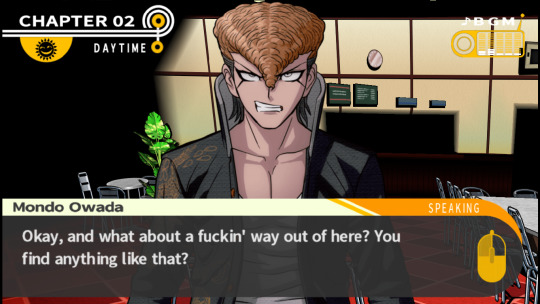
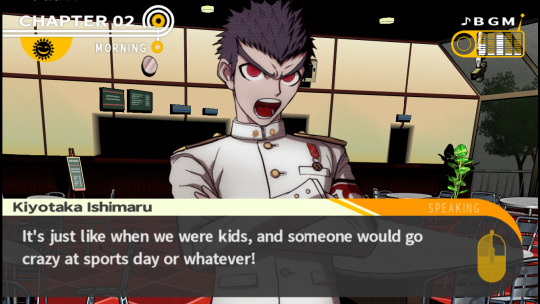
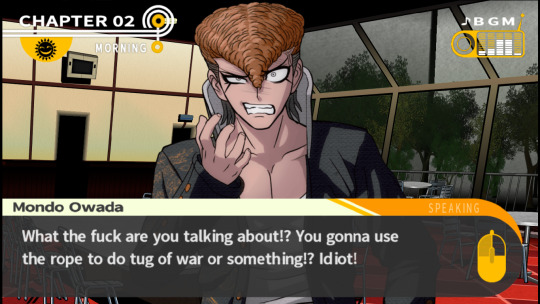
Mondo and Taka are both demonstrating the desire to protect their classmates here, but in different ways. Taka is the more logical of the two, focusing on keeping track of resources and devising a system of check for everyone to keep watch over each other in the breakfast promise. Mondo, meanwhile, wants to push the importance of actually getting everyone the fuck out of there. While their endgoal is the same, they disagree on how to go about it, and both their stubbornness drives them to butt heads as time continues to pass, leading to the sauna scene.
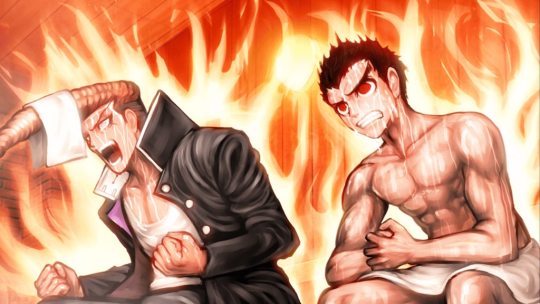
After being slowly built up in the background, Ishimondo's mutual anger finally comes to a head, with both not understanding the position that the other is in. Taka still believes Mondo's value to be what he provides to society, and as a biker gang leader, that's not much to a man that lives by lawful discipline. Meanwhile, Mondo can only see Taka as an egomaniac with a stick up his ass and doesn't know the background to why(and neither does the player without actively seeking out his FTEs). They each follow a different code of ethics, and view themself as the protector of the class, leading them to see each other as rivals. Yet, despite that, both of them still share their core value of total dedication, and so when finding a way to prove themself the better man, they end up with an endurance competition. For Taka, this reflects his belief that men connect by baring their souls, and do so by baring their bodies(something only learned in-game by approaching him for FTEs).
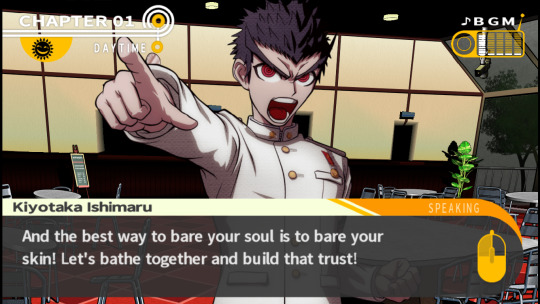
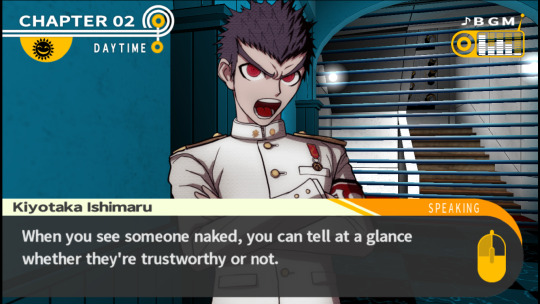
(This also leads to the implication that, while Mondo insisted on entering the sauna with all his clothes on, at some point, he was, in fact, naked while with Taka that night.)
The information as to what happened in that sauna is intentionally left unanswered, remaining fully private between both men in-game. The only thing either of them will say is that a brotherhood was formed between them, and that who won their initial contest no longer matters. Finally, Taka has found someone. Someone he can confide in and lean on, someone who'll support him and that he can support in turn.
"And if you can't do it alone, just find someone to support you, and you can support them back! That's how you can overcome any storm!" -Kiyotaka Ishimaru, ch 1
And then Chihiro's case happens.
At first, when the motives are introduced, Taka is one of the few to vocally insist no murder will take place. He has newfound confidence in the willpower of his classmates, and puts faith into everyone else for the first and only time. Even when presented with his own unknown secret, he finds it ridiculous that anyone would kill over the embarrassing memories and secrets. It's here that we truly see the highest high of this character- when he comes up with the idea to share secrets. When he presents this idea, he moves forward as usual, preparing to be the first one to reveal their secret and take the pressure off. But when his classmates insist they can't (Toko & Celeste) he doesn't keep chugging along, and he doesn't completely shut down, either. He looks around at his classmates, and he asks Chihiro. He actually steps back and asks for someone else's opinion.
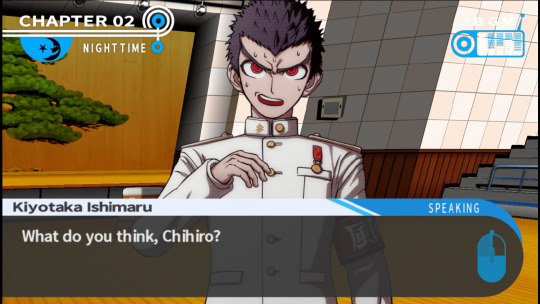
And when she isn't yet comfortable, he backs off. He respect her wishes, and he stands with the class, ready to help them face their secrets the following day. Finding a friend in Mondo has softened his rigid exterior a little bit, enough to actually consider the opinions of the others. He's gotten comfortable. All that comes crashing down with the discovery of Chihiro's body the next morning. After finally taking a step back and letting his classmates- his friends- make their own choices, it directly leads to the murder of one of them.
"Dammit! I'm sorry, Chihiro... It's all because I wasn't strong enough!" -Kiyotaka Ishimaru, ch 2
Taka fully blames himself for allowing Chihiro to be murdered, and as the guilt of failure starts to set in on him, he looks to his ethics and order to solve it. Chihiro may be dead, but the murderer will be condemned through the class trial.
"Justice always prevails! Right, bro!?" -Kiyotaka Ishimaru, ch 2
A solution, a path forward, still exists for him. He still has Mondo by his side, and he and the rest of the class can surely prevent this from happening again, right?
The trial only validates him at first, revealing the existence of a serial killer among the group, someone so clearly immoral for her killing obsession. But it's not her. Why isn't it her?
"Could such a heinous villain really be innocent!?" -Kiyotaka Ishimaru, ch 2
But his confusion is quickly stamped out- of course, it's Byakuya, the guy that's been threatening everyone and refusing to cooperate, the guy that has no regard for the rest of their classmates.
"He kept calling this a game, right? So he'd totally be willing to do whatever it takes to 'win'!" -Kiyotaka Ishimaru, ch 2
But no, wrong again- he didn't know that the murder was in the boys' locker room, and was taken aback by Chihiro being AMAB. It should be him, someone so clearly antagonistic, that's how it's supposed to go, right?? But no, it's wrong! Why? And, who could kill someone like Chihiro at their most vulnerable?
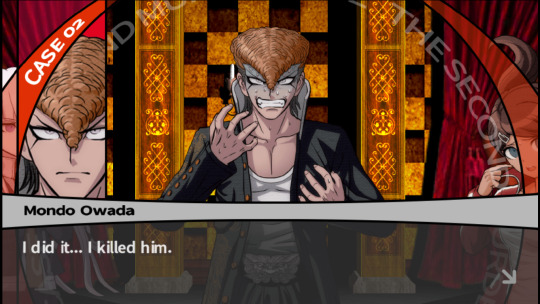
He's failed. Taka's failed in every way conceivable. Mondo, the first person he's ever truly felt connected to, a murderer? Chihiro's murderer? That can't be it. Even long after Mondo's stopped arguing, Taka continues to push back against Makoto and Kyoko's accusations. It's a coincidence, that's not actually proof, anything to get them to stop, to save his brother, to save himself from the reality he's about to have to face. When sent into the BTB, it's Taka we fight in his despair, not Mondo. Until the very end, Taka won't acknowledge it. He can't. He can't bring himself to vote his Mondo a murderer, a killer. How could the man who gave him the chance no one else would, ever be so cruel?
"I- I refuse to believe it... There's no way... no way he would kill someone! Why!? Why why why why why!? WHYYY!? Why did you do it!?" -Kiyotaka Ishimaru, ch 2
He learns the truth of Mondo's story alongside the rest of the class, unable to process it all. It makes no sense. They were friends who trusted each other, who helped each other. And what about the man's promise? Doesn't that count for anything!? This doesn't sound right. This isn't Mondo, not his Mondo, not the man from the sauna. How could he have been so wrong about him?! It just can't be, but it is; the truth is but a slap to the face.
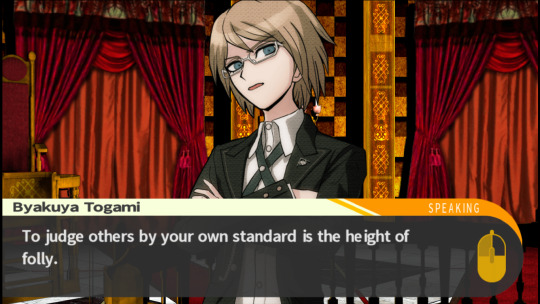
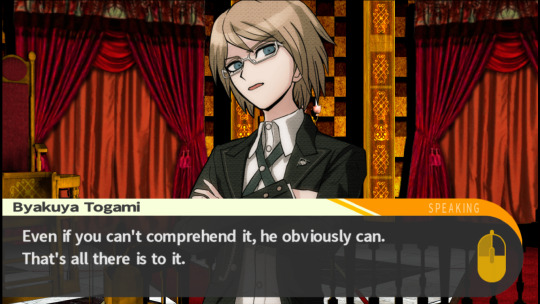
He was wrong. He stood by Chihiro's killer and defended him. He let his brother become the monster he saw himself as. He didn't stop it when he could have. He was blinded by his own beliefs, and as he watches Mondo's death, his spirit dies with him, the game cutting out all music as Taka screams, filling a deafening silence.
"As Taka's sad screams invaded our skulls, we were each forced to realize once again..." -Makoto Naegi, ch 2
4.2- Kiyondo Ishida
Taka enters chapter 3 as a hollowed out shell of himself. He's gone near comatose, staring at nothing and saying nothing. He won't eat, won't speak, won't sleep, and although there are a couple weak attempts to get him back in action from Hiro("It's times like this where the committee chairman needs to get things going with a BANG!"), he's mostly left to grieve by himself, as the rest of cast is more concerned with the expanded school than the bossy guy they didn't like that much.
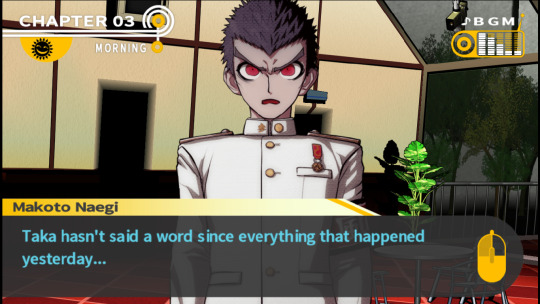
Monokuma even goes out of his way to torture Taka, to punish him for his grief, lying about the existence of a time machine just to fuck with his head and give him false hope, sending him further into despair.
"Hmm... You sound disappointed. But actually, I was lying about the whole thing anyway. There's no such thing as time machines!" -Monokuma, ch 3
He's forced to become Monokuma's most successful project from the class, completely and utterly destroyed.
When he learns of Alter Ego, something in his head clicks. He can still talk to Chihiro. He can repent. He can apologize directly to him. So, with Makoto's help, he's brought to the laptop. His guilt finishes totally consuming him as he asks:
"Do you... hate Mondo? And since I couldn't stop him... do you hate me?" -Kiyotaka Ishimaru, ch 3
His own self-hatred stemming from his failure is projected onto Alter Ego in one last attempt to come to terms with what's happened. The response he receives, unfortunately, is the culmination of all the toxic and unhealthy ideas of manhood the other boys carried with them via an attempted simulation of Mondo.
"You're not letting yourself get crushed under the weight of that responsibility, are you!? A man's only worth as much as the load he can carry! You get it, right bro!? Hell, what am I saying? Of course ya do!" -Alter Ego, ch 3
"So you're just gonna stand there, huh? Just wait for things to get better? Just take your time and get all depressed... Take the time to indulge your regrets... You might even start walking again without realizing it. Sure, that kind of mediocre thing might work for some people." -Alter Ego, ch 3
This speech, while attempting to inspire Taka to keep living for Chihiro's and Mondo's sakes, encapsulates the desperate need to be perceived as strong and untouchable that Mondo himself carried, and that Chihiro admired so much. It sinks its way into Taka, convincing him that the way to respond to his guilt is simple- pretend it isn't there! Mondo has clearly returned to him, and he's never letting him go ever again. He fully deludes himself, and he's fused with this idealized version of his bro. He permanently ties himself to Mondo's memory, and goes from the SHSL Public Morals Committee Member to something else entirely- Kiyondo Ishida, the unholy mixture of both men.
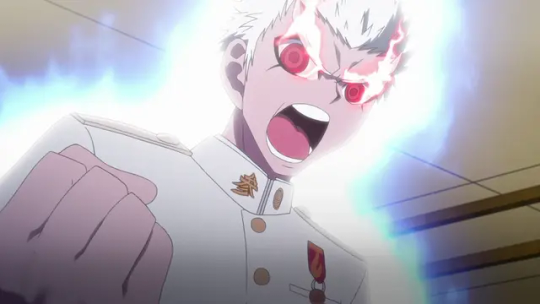
This revelation also leads him to an obsession with Alter Ego, viewing it as the vessel in which his bro was returned to him. He views it as another chance to protect his bro from ever being hurt again, as some divine second-chance he's been granted. All desire to be around the rest of his class is gone, replaced with this obsession. He's put at odds with Hifumi, who's also connected with the AI, and separates himself from the group that much more. When Alter Ego disappears, he can't handle it. He panics. He won't let his bro die, not again. And so he dooms himself, refusing to let go of the shadows of the past enough to see his own death looming before him, and he's killed in the early hours of the morning, led by desperation to his demise. And even so, the class can only worry about the semantics of when he died, barely mourning him.
5- Isolation (What's the point of this guy, anyway?)
Rather than learning from the mistakes both Chihiro and Mondo made by subscribing to the societal expectations of what makes a man, Taka ends up doubling down, burning away the optimism and more reasonable logic Taka used to have. Taka's story is that of a doomed fate to become the symbol of manhood and its self-destructing nature, leeching off of his first and only friend's unhealthy behaviors and sending him spiraling. And it's allowed to happen because of his social isolation.
From the very beginning of the game, Taka is singled out as annoying to be around. He's put in a negative light and viewed as unpleasant to spend time with. Every attempt to befriend or connect with a classmate is written off as a nuisance, a hindrance. Taka doesn't know how to make friends. He doesn't know how to do anything besides follow the rules and regulations he's been taught. He sticks to his regimen, because it's comfortable, and doesn't understand why others can't conform in the way that he does. He's very thoroughly isolated mentally and emotionally from his classmates at every turn, to the point where even in the very first trial he's standing with no one but the dead by his side(as Sayaka and "Junko" were positioned on either side of his podium).
All this is done with the deliberate intention to showcase his solitude, and more importantly, the loneliness that comes from it. It's to the point that when he finally does make a friend, he thoroughly idealizes him in his subconscious, coming to view him as some perfect person who'd even support him. It's inherently contradictory from his established beliefs going into the game, that a delinquent could be kind, but he accepts it wholeheartedly. He gets to know Mondo on some deeper level while in that sauna, and it's enough to rapidly develop a massive codependency on him. So when Mondo self-destructs and dies, so too does Taka.
Taka's purpose as a character is to suffer. He wraps himself in his moral beliefs, remaining steadfast in what he views as right and wrong, making judgement calls he's 100% sure of, and when they're challenged/disproven, he's thrown wholly out of whack. He exists to serve a purpose- what would've happened if Makoto didn't accept the truth about Sayaka? What happens when you let your idealism blind you to the truth? What happens when you blind yourself to the reality of the people around you, of the darkness in the people you care about? You self-destruct. He's tossed aside, killed as an accessory to the plot of someone who does nothing but manipulate the truth. He dies, and that's just it. His story is cut short; he doesn't get to heal or grow or come to terms with the truth. Such is the fate of the failed.
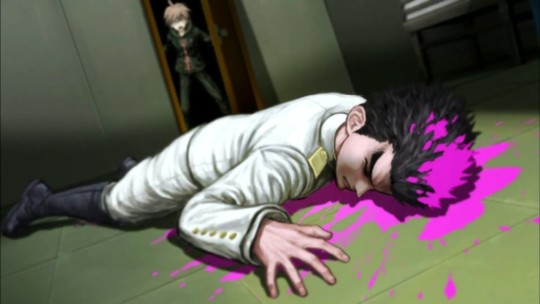
Afterword
...I didn't even touch his FTEs for this. Holy shit.
I'm gonna be honest, as much as I love Taka, I never expected this post would become as long as it did, or that I'd uncover such a dark fucking reason for why he gets as totally fucked over as he does. Don't get me wrong, I still really wish he'd lived and gotten to grow after this, but maybe his death was more well-written than I used to think. Good god.
#danganronpa#danganronpa trigger happy havoc#trigger happy havoc#thh#dr thh#dr thh spoilers#danganronpa thh#kiyotaka ishimaru#ishimaru kiyotaka#danganronpa kiyotaka#character analysis#character study#analysis#fan theory#DR character analysis#chihiro fujisaki#mondo owada#ishimondo#alter ego
297 notes
·
View notes
Text

Shame on Webster's. I'm of the belief that words mean things, I'm not saying that words can't change or that their meanings don't shift over time. But to have a definition that directly contradicts itself and is objectively wrong on a scientific basis is absurd. Note also Webster's is the only dictionary that currently uses this definition.
77 notes
·
View notes
Text
My issue with how Naruto is portrayed as hokage in Boruto, and subsequently the treatment of the surviving Uchiha (Sasuke and Sarada) in Boruto, is that it undermines the political messaging of Naruto completely.
So Naruto (the character) agrees with Nagato and Sasuke regarding the abuse they faced and the need for an overhaul of Shinobi society. This is not where he disagrees with them. Naruto (the character) is the closest thing the manga has to a pacifist (though he's a poor representation of one, I'm not going to harp on that too hard as I'm not expecting the shonen manga to get too deep into leftist political theory for its audience of 12 year olds). He is not shown to actually disagree with Nagato or Sasuke on the basis of their beliefs, but instead on their actions. Naruto doesn't believe that mass suffering is needed to bring peace (Nagato's plan of causing pain to bring empathy.) He also doesn't believe in killing all of the kages or martyring Sasuke as someone to be eternally hated for the sake of peace. His issue with killing the kages has to do with the instability that would lead to (what we're shown).
So in modern terms, Naruto is closest to a socdem - someone who wants to work within the system to bring about leftist changes to the system.
Okay
But then we get to Boruto and we have:
The Uchiha tablet has been moved to the middle of the woods, effectively erasing their culture from Konoha completely
Sarada has people making comments about her carrying the curse of hate and faces discrimination for her ancestors part in the fourth war - meaning the very conditions which facilitated the Uchiha massacre/genocide are still in place, furthered by a lack of history education of the Uchiha via the removal of their cultural texts to outside the village (the tablet)
Children still are sent to fight and die for Konoha
The council of elders still has political strength
The anbu still exist
Those who took part in hiding the truth behind the Uchiha massacre/genocide have faced no consequences and have maintained their positions of power
The hokage still has an unlimited term AND is not elected by the citizens of Konoha - the hokage still falls under the control of the will of the elders if they wish to keep their position
And the thing that gets me is that there is no evidence in Naruto (the manga) that Naruto (the character) would hide the truth of the Uchiha massacre. He immediately went to tell people but was held back by Kakashi, but Kakashi would have no power over him once he's hokage.
So is this some commentary about how revolution is the only path forward towards change? I'd be shocked at kishi's sudden change in political beliefs but fair enough, i can totally work with the narrative through that view point.
But the why the fuck is Sasuke, the main revolutionary of the series, now an asset of the state?
Or was the idea that change takes time?
But why were they able to erect a statue of Itachi whilst moving the last of Uchiha culture literally outside the village.
Is it that Kishi didn't think about his own political messages before writing Boruto, effectively ruining Naruto's character as a fighter for the oppressed?
Most likely.
Because at the end of Naruto, Naruto vowed to fight for the oppressed. He wanted to fix things for Nagato, and Neji, and Sasuke. He wanted to overhaul the entire system, he just wanted to do so in a way that wouldn't result in more civilian deaths.
That his time as hokage in canon has finished the eradication of a culture from konoha, continued the abuses of children, did not end Konoha's economic reliance on violence, and more is a complete destruction of his character.
And the thing is that Naruto didn't have to end by validating Nagato, Neji, and Sasuke's beliefs. Kishi could have gone full ally of the oppressive state and painted them as incorrect wholly and completely.
He didn't.
He made the choice to have them be objectively mistreated and to have his protagonist agree that change was necessary. HE is the one who validated them. He is the one who wrote their oppression into the story, and also had his protagonist agree they were oppressed and that change is necessary
#anti boruto#sorry if this is incoherent#im at work#and this is a word vomit ramble#naruto#pro sasuke uchiha#pro neji hyuga#pro nagato
119 notes
·
View notes
Text
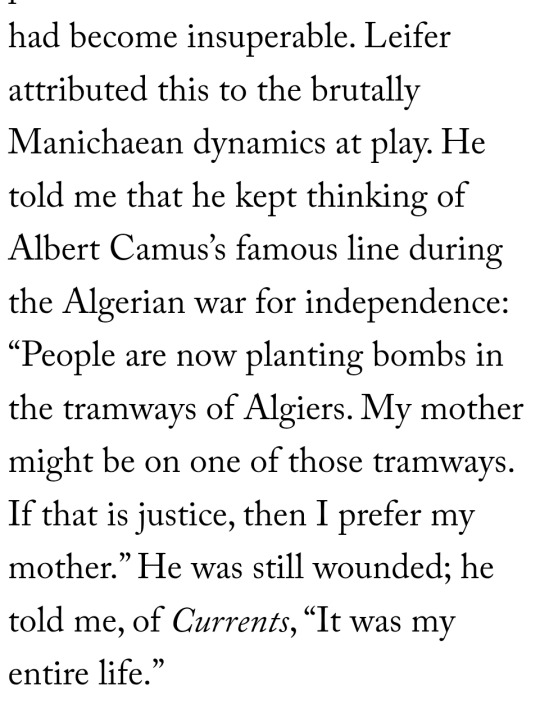
For Liefer to pull up a Camus quote like this is quite laughable because of how the dynamics mirror each other. In the modern day, we have a status quo where Palestinians continue to be imprisoned and murdered and raped and segregated, denied basic medical care for years on end, all on their own land — while Jewish Israelis (to make distinction from Palestinians with Israeli citizenship, as many liberal zionists love to point out) suffer no consequences for anything, even if they play a direct role in the continued erasure and genocide of Palestinians. So if given a choice between suffering no consequences while benefiting from the status quo (that will not change unless the oppressed take it upon themselves to change their circumstance) and suffering consequences in the form of direct personal loss (with the strategy of forcing things to change by ennacting the same type of violence that the occupied experience on a daily basis onto the occupiers), of course someone who stands to lose nothing from the continuation of the status quo would rather the status quo continue if he has something to lose otherwise. Camus, when he said this quote, was not being righteous or overly sensitive. If anything, it shows how little he understood at the time of saying this quote. Because he didn't understand that an Algerian will suffer in both scenarios even if he (Camus) is safe, and for him to say something like this when people lived generations worth of violence for his and his family's (social) benefit is annoying and just plain offensive. Who is he, as a Frenchman born in occupied Algeria, to say what is worth justice when he only stands to lose anything in one scenario but not the other? He did not experience life as an Algerian native in French occupation. He might have observed it, growing up poor, yes, but he never LIVED it. Liefer might have observed the horror of settler colonialism, but that's nothing like experiencing it firsthand. To be the object of hatred to people who have higher status and more rights than you. It's just not his place as a person with nothing to lose if the status quo continues to comment on anything like this. What's the underlying meaning of this quote? "I'd rather others continue to suffer than myself experiencing suffering once."
I'm not saying Liefer doesn't have a right to mourn whoever. Im not even saying he has a duty to accept the consequences he experiences. But to say something so heartless as "I prefer the safety of my own rather than justice" within the larger, nearly century worth of context, is just insensitive and really belies his true opinions of the liberation of Palestine if he's so comfortable saying this outloud with moral authority in the middle of what is an outright bloodbath of Palestinians across Palestine. It's the timing of saying something like this because to say it now of all times when the entire world ignores or even encourages the violence in Gaza but mourns the death of Israelis? An Algerian born Frenchman and Israeli are going to be mourned on an international scale... but Palestinian and Algerian natives? Their deaths are regarded as facts of life by the rest of the world.
This makes it seem like I hate Camus, but I honestly don't, but I think the way Leifer is holding this quote up at face value and as the height of reason really is annoying. People like to mention Camus' "if" in this case as proof that he's actually saying "this is not real justice so therefore I do not have to accept it," but who is he to say what is or is not justice? The point I'm getting at is the people who benefit from occupation, in this case, Camus and Liefer have no right to determine what is or is not justice, despite their personal beliefs. The occupier has no right to tell the occupied what they should do to get freed. That alone is an arrogance in assertion that is so offending — the assertion that the occupier knows how to free the occupied in what *he* considers justice and the occupied just need to do whatever the occupier tells them to do. Because whether they both like it or not, they still benefit from and are part of the occupying force, and therefore have no real reason to fight the occupation at their own expense — the occupation is a violence that they are alright with inflicting if it means they cannot lose anything or anyone.
Also the idea that liefer indirectly compares himself to Camus is a little funny to me.
#this makes it seem like i really hate camus but i dont i think hes an alright writer#but to remove his works from his own sociopolitical context is annoying and a false evaluation of the meaning of his world#*his work#camus is somewhat orientalist in his works. he has some interesting ideas but it doesnt change the fact that a frenchman is of a different#class that other algerians#even if camus was poor growing up - even the richest of algerians suffered occupation in a way camus never did#im almost certain liefer was born affluent and is still affluent#so there is no class solidarity between liefer and a working class palestinian#like how there was between camus and working class algerians#so he cant even compare himself to camus
150 notes
·
View notes
Text
i posted this on twitter also but it’s still eating at me. i’m so fucking embarrassed to be jewish rn. i dont want to be associated with this ongoing bullshit from israel. why do we need our own state. theyre just making every jew across the globe look bad in general even though many of us are conflicted about zionism and the legitimacy of israel as a state
people have hated jews throughout history for no fuckin reason but now israel exists but now its like. GIVING people reasons to hate us as a group. note that i DON’T conflate zionism with jewishness, but a lot of people in the world don’t know the difference because theyre uninformed and been dripfed cultural antisemitic tropes their whole life and that’s the scary part is them falsely putting two and two together. like what the fuck israel stop youre just putting fuel on the fire for people around the world to hate an entire group of historically persecuted people if youre being this shitty with your insane colonialism and apartheid like……I Want No Fuckin Part Of This. you’re spelling our own doom. you cant just swoop in and go “mine now” and then oppress the people you took land from under a regime without my blood boiling at the injustice no matter WHO you are. even if my lineage is tied to you. so when news outlets support israel it doesn’t feel like they have the best interest of jews as a people in mind. it’s in the interest of a zionist ethnostate and whatever that christian zionism belief is about the jewish people returning to the holy land as prerequisite for the second coming of jesus. its not like they care about us as a dispersed ethnocultural group, it’s all for that religious narrative that a bunch of people in the US are backing.
saying you want all jews to die is antisemitic. beating someone up because they’re jewish and no other reason without knowing their views is antisemitic. criticizing human rights violations perpetrated by israel and the belief that one group deserves more rights another is not antisemitic. and the fact that israel has the ability to pull that antisemitism card in response to criticisms of the violations they commit because their state is the “jewish homeland” drives me fucking insane. take fucking accountability for your actions. and yes, there do exist full-on anti-jewish groups in the middle east that go beyond hatred of israel’s policies and existence as a state and i’m tired of people pretending there aren’t in fear of appearing to seem like they support the state of israel. on the other side of things many people overestimate this by fearmongering and saying EVERY arab is out to get jews worldwide, telling people like me “they want YOU dead”. this is not the belief every person in the middle east and it really rubs me the wrong way that people group millions of individuals into all-encompassing lumps like this. many people there do understand nuance of this political situation.
even if i have that “right of return” by israeli law or whatever, i don’t feel obliged to it; it does not register as fair. why do i have a “right of return” when i’ve never even been there in the first place while palestinians who have homes there can’t return to them? what’s the basis for that? substituting objective reality with an imaginary reality? i don’t think like that. i can hypothetically come and go whenever i please but palestinians are severely limited in mobility? what makes me more entitled to that land than the people who lived there for centuries? nothing that comes from natural law thats for sure. it’s all artificial and inflated.
but at the same time i also dont want to be the target of antisemitism and caught in the fray just for being ethnically jewish. once people start calling for the genocide of entire groups we’ve got issues (and you better believe this absolutely applies to the palestinian victims in gaza too), because people who dissent to the violence perpetrated by the loudest are caught in there with the people who are perpetrating the violence. lack of nuance. people conflating israel and its zionist apartheid policies with jewish ethnicity and culture worldwide. other people conflating being terrorist anti-jew with muslims worldwide (like that 6-year old palestinian-american boy that was just stabbed to death in chicago). scary times man. but as a jew i can’t just opt out of this if it’s how i was born as. i don’t have control over that. but i can control what i think and what my beliefs are
#israel palestine conflict#israel#palestine#what i feel is right most strongly resonates with secular humanist philosophy#never really found the right way to explain my worldview until i read about it
565 notes
·
View notes
Text
Why Discourse? A Short Essay
Read time: 2-3 mins
Periodically, someone in the otherkin and/or therian tags stands up and declares that there should be no more discourse. That we need to leave it behind. We should all touch grass and get along. We should certainly stop spending so much time fretting and arguing over words and their definitions.
Before I get into why I disagree with this stance, I want to be clear that I absolutely understand where this position comes from. I’m not contemptuous. There is a great deal of petty nonsense on this site that gets labeled as serious discourse, and it’s highly unlikely that whatever intracommunity conflict is going on in the nonhuman tags is the most importantly thing in someone’s life. It’s annoying to see if you don’t want to engage, and it’s also pretty hard to block out. The community probably would be better if there wasn’t so much discourse, but that would necessitate nothing left worth discourse-ing.
And that is the exact trouble. There remain myriad problems that trouble the community, and in all likelihood there will continue to be problems. To reject discourse is to reject the illumination and discussion of these problems. And I don’t mean the sort of “X is a bad person because I said so” conversations that pop up every so often, I mean the very real racism, ableism and sanism that continue to haunt this community. If talk of these problems, too, is labeled as “discourse” (which, let’s be honest, it is) then calls to stop discourse become pleas to maintain the status quo.
Community is not a static object. It is molded. Its pliability is evidenced by the lamentation of differences between the therian communities on here (tumblr) verses TikTok verses Reddit verses the forums of old. These communities are shaped by the individuals that inhabit them and their beliefs (among other things). Discourse is one of the ways we shape our communities for the present and for the future. It’s partly how we decide what is and is not acceptable discussion, behavior and comportment within our ranks. Without it, there is no way for individuals to speak their mind about the state and direction of the community.
For example. Let’s say someone coins a new term. And let’s say the community likes this term. They use it, it’s helpful. That’s great. But maybe that term has an ahistorical or appropriative basis. Or maybe individuals are going to other members of the community and saying “you’re not X you’re actually [new term]”. Should the affected members of the community not speak up? Sure, in the scheme of life and the “real world” it’s easy to say “who cares?” It’s just one term. But what happens in two years. Or five, or ten. When no one speaks up and this happens again and again, and more and more of the community is wedged out by various issues that go uncommented on? Who does that serve when the issues that drive people out are all but guaranteed to be reflections of the biases that exist in our human societies? What will the community look like when nothing but the hegemony is reinforced?
I’m not trying to say that every topic of discourse is equally merited. A lot of it is inane and immature and straightforwardly unhelpful. But some of it isn’t. Some of it will dictate what the community is like for years. Dismissing all discourse as equally useless is chucking the baby out with the bath water.
I can understand if over the course of this essay I’ve made it seem like discourse is of singular importance to me. Contrary to what it seems, maybe, I do have a life offline. But I have not been shy in discussing my long time issues feeling welcome in the therian community, and so I’m invested in making this a space where no one has to bounce off it as many times as I have. One way I can do that is by pushing back against beliefs that have ostracized myself and my friends. The problem, or perhaps the beauty, of therian spaces is that they’re pretty singular. There are furry communities or other adjacent social groups, but I found if you’re nonhuman, you really want the opportunity to be in community with other nonhumans. And certain beliefs and practices can make that difficult for some and leave them with nowhere else to go. From what I’ve heard of other websites, the tumblr therian space is amongst the more accepting, and if someone is pushed off here, it’s unlikely they have anywhere to turn but personal blogs or journaling sites that don’t offer much in the way of connection. Discourse is the one way I, with my limited reach and energy, can change a few hearts and minds on the issues in this community that affect me.
I think it’s also worth mentioning that discourse is not just “discussion I don’t want to see.” “There should be less discourse” is discourse. Any discussion of community reform is discourse. Any back and forth of opinions between individuals is discourse.
I’m not saying you have to like it. I’m certainly not saying you have to participate. You are entirely free to plug your ears and close your eyes to discourse and I will say you’re probably wiser and stronger willed than I am. You are completely free to live your grass-touching life how you’d like. But please do not call for the end of discourse entirely. Please do not act like discourse is the worst thing someone in this community can do, or that it’s “what’s wrong” with the therian community on tumblr. I think it’s fair to say you don’t like it, but it serves a purpose.
40 notes
·
View notes
Text
Here's a conversation that I have with myself at least 3 times a week and I need to get it off my chest.
I hate Himmler so, so much. His pseudo-scientific bullshit pisses me off on a near-daily basis. Despite the sheer amount of intelligent and scientific minds working for the Third Reich, they achieved so little, particularly when it comes to biology and anthropology.
I am in no way a supporter of the belief that the ends justify the means. I do however think that if something positive can be salvaged from tragedy, then it should. The Pernkopf Atlas is an example of this, and despite having such dark origin, it has genuinely helped surgeons operating on people today, and has advanced science. Unfortunately however, I'd say that the Pernkopf Atlas was created in spite of Nazism, not because of it. Too many people were making desperate attempts to prove theories that were grounded in quasi-religious racial mysticism, rather than actually recording and analysing facts, and having an objective view on things.
Mengele's experiments were all but useless. Ethics aside, they were unstructured, unrecorded, and worst of all, unscientific. That's not because Mengele was stupid; he was reported as being fairly intelligent by those who knew him. But he was put in an environment that actively discouraged scientific and progressive thinking, which ironically (but not surprisingly) had a negative impact on the Third Reich itself. That's not to excuse any of Mengele's actions, of course, although I do believe that he had potential, and in another timeline he could've achieved something valuable.
Not only were so many lives lost, but they were lost in vain, when they didn't have to be. It was men like Himmler, amongst others, who actively halted progress and encouraged medieval thinking, wrapped up in shiny modern technology.

Image from the Atlas of Topographical and Applied Human Anatomy by Eduard Pernkopf
#reichblr#3rd reich#ww2#wwii#reich fandom#ww2 germany#josef mengele#onkel pepi#heinrich himmler#eduard pernkopf#wwii history#Pernkopf Atlas
30 notes
·
View notes
Text
Assumptions Harden Into Fact - Neville Goddard
In this lecture, Neville discusses how assumptions or beliefs are the basis of the law of assumption. He uses stories from the Bible that talk about manifestation “between you, the sleeping one, the deeper you, and the conscious waking you” otherwise known as the subconscious and the conscious minds.
“Concentrate your attention upon the idea of identifying yourself with your ideal. Assume you are already that which you seek and your assumption, though false, if sustained, will harden into fact.”

Creation is finished
“There is nothing to be that is not now. There is nothing to be created for all things are already yours, they are all finished.”
What you desire already exists within consciousness. You cannot imagine something if it is impossible, because the brain cannot create something that does not exist. Anything you can imagine already exists and therefore can manifest in the physical world.
“Your dimensionally greater Self has ways that the lesser, or three-dimensional you, know not of.”
Your inner man knows exactly how to bring your desires to fruition, you do not need to take any action or try to figure out how it will manifest physically.
You only need to assume that it is yours in order to manifest it, nothing else.
“Although man may not be able to stand physically upon a state, he can always stand mentally upon any desired state.”
Even if you are not currently experiencing your ideal physical world, you can always access your ideal life through imagination.
“Remain in the mental state defined as your objective until it has the feeling of reality, and all the forces of heaven and earth will rush to aid its embodiment."
As long as you persist in your fulfilled desires, it will manifest.
“In my Father’s house are unnumbered concepts of self”
You will never deplete the world of your desires, because they are infinite.
There are an infinite amount of states you can occupy, so mentally prepare that state you desire to dwell in and then occupy it.
SATS
Neville calls SATS a “controlled waking dream”
The wish fulfilled should be achieved with minimal effort.
Experience the imaginal act that implies the fulfillment of your desire and the feeling of the wish fulfilled will come as long as you fully immerse yourself within this act.
Do not force the feeling, allow it to envelop you naturally.
“Know what you want. Then construct a single event, an event which implies fulfillment of your wish. Restrict the event to a single act.” or you can use the lullaby method, by reducing the fulfillment of your desire to a short and simple phrase.
“Just relax and enter into the feeling of actually being what you want to be.”
Don't overcomplicate or stress yourself out by wondering if you're doing it "right." It does not need to be super detailed.
As long as what you are doing is implying to you that your wish is fulfilled, then you are doing it right.
“Refuse to enter into conversations that are unlovely, refuse to listen attentively to anything that tears down.”
Do not pay attention to the 3D when it tries to show you things that do not align with your wish fulfilled. Ignore it and remember that the true reality is consciousness and what you experienced in imagination is the only truth there is

Neville in most of his lectures uses stories from the bible that he believes explain, in an allegorical way, how to manifest. In this lecture, he discusses 4 different stories. I've broken down the most important points from those stories for clarity purposes. It may be easier to understand if you read the stories side by side with these notes.
The story of Pilate and the crucifixion of Jesus and Passover
“For desire is to confess that you do not now possess what you desire, and because all things are yours, you rob yourself by living in that state of desire”
“I cannot have and still continue to desire what I have. I may enjoy it, but I cannot continue wanting it”
This is another example of double-mindedness, or serving two masters (see previous lecture post). You cannot desire something you already have.
“Man is incapable of passing over from one state of consciousness into another unless he releases from consciousness that which he now entertains, for it anchors him where he is”
You must die to the old state in order to pass over to the new state.
You cannot stay the same (with the same beliefs and thoughts) and also enter a new state. You must completely leave the old you behind and become your desired self.
Let go of previous beliefs that hinder you from fully entering your new beliefs.
“If at this very moment you have an unfulfilled ambition, then you are entertaining that which denies the fulfillment of the ambition, and that which denies it is Barabbas.”
If you have a desire that you have not fulfilled within yourself, the only person denying the fulfillment of that desire is you.
“You must now become identified with the ideal that you would serve, and you must remain faithful to the ideal.”
“You walk in the consciousness of being that which you want to be, no one sees it as yet, but you do not need a man to roll away the problems and the obstacles of life in order to express that which you are conscious of being.”
Release your old state (your old self) and replace that with your new state (your desired or ideal self)
Neville says that you will know that you changed your state when you look mentally at the people you know and notice a change in relationship.
“We must imagine that others see us as they would see us were we what we desire to be”
If you successfully changed self, others will see you differently, they will see you as you desire to be seen.
Jesus in the garden of Gethsemane
The purpose of Neville explaining this story is to talk about the meditative state that you prepare in your mind before engaging in SATS or the lullaby method.
The garden is your “prepared mind” a calm, still state of mind in which you are drowsy and near sleep (basically SATS)
“All creation [...] takes place in the state of sleep, or that state which is akin to sleep”
In this garden, you die to your old conception of self and resurrect as your new ideal state.
Let go of your previous self-concept and create a new one and completely embody that.
Book of Joshua
Your consciousness has created everything you have.
You do not stop manifesting, and you never “began” manifesting. You have always created the life around you.
You can have all you desire, as long as you experience it in consciousness and believe that it is yours.
“You are functioning three-dimensionally and you cannot seem to reach the fourth-dimensional world where your present desire is already a concrete objective reality. You cannot seem to reach it because your senses bar you from it. Reason tells you it is impossible, all things round about you tell you it is not true.”
Your inability to grant reality upon imagination and placing too much emphasis on conditions, reason, and the physical world is keeping you from experiencing the true fulfillment of all your desires. Since you believe it is impossible, you have made it so.
Rahab
No one can see your internal world, no one can see your imagination.
“You have within you the capacity to appropriate a state without knowing the means that will be employed to realize that end and you assume the feeling of the wish fulfilled without having any of the talents that ment claim you must possess in order to do so.”
“Satisfy self by appropriating the feeling that you are what you want to be”
However, you seem to notice that the physical you is not satisfied until it comes to be, until it’s physically manifested.
The Sabbath: “the state when man is completely unmoved in his conviction that the thing is. When I can assume the feeling of my wish fulfilled and go to sleep, unconcerned, undisturbed, I am at rest mentally, and am keeping the Sabbath” (persisting)
Circumstances will work themselves out, barriers will be moved, and countless events will happen in order to make your desire real in the physical world.
You will never lose your ability to manifest, it will always be yours.
The Book of Numbers
Man is the temple of god and man’s imagination is the well from which all things grow.
“Assume the feeling of the wish fulfilled and go to sleep in this mood”
“The sensation which dominates the mind of man as he falls asleep, though false, will harden into fact.”
Neville believes that this sensation before sleep (the state akin to sleep or SATS) is the way that the conscious man can access the subconscious mind easiest. Falling asleep to an imaginal act (or lullaby - affirmations such as “isn’t it wonderful”) that implies the fulfillment of your desire is how you manifest.
“But we have a living tabernacle wherein God dwells [man is the temple of God], and it is covered with a cloud which can and does ascend when we go to sleep or are in a state akin to sleep [man can use imagination to access consciousness and become that which he desires]. Not necessarily in two days, it can ascend in two minutes. Why did they give you two days? If I now become the man I want to be, I may become dissatisfied tomorrow. I should at least give it a day before I decide to move on.”
Persistence is important because the outer world (conditions, reason, etc) can influence us to falter sometimes. We must return to the wish fulfilled when this happens and continue to be faithful to that.
#manifestation#law of assumption#neville goddard#loa#loassumption#edward art#nakedbibi333 posts#Notes on Neville Goddard’s teachings#ng notes#neville notes
132 notes
·
View notes
Text
Anakt Garden is so fascinating, the school's significance in the main casts lives and it's role in upholding and maintaining the system they live in and the grand scheme of Alien stage and its contestants and it's way of elaborating on Aliens and mankind's great shift after earth's invasion is just amazing to me even if it's not talked about in the story as often, most importantly Anakt Garden practically functions like a religious private school, and the religious undertones adds to the story significantly because (surprisingly) religion doesn't function so differently in Alien stage than it does in the real world
Religion is an integral part of human life, as it has preserved itself even after decades into the modern day. But even beyond that, it is human nature to seek guidance in something or someone, a god, deity, object, etc. It's a case-by-case basis on "Why am I religious?", but I believe that is the basic consensus.

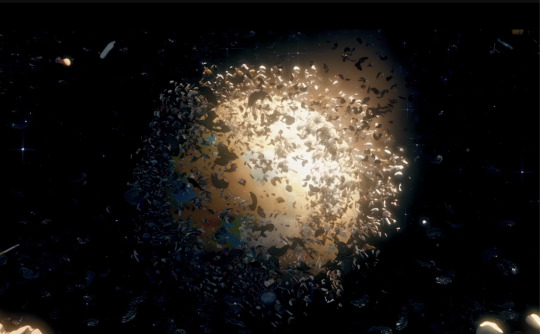
In ALNST, religion still exists despite Earth's eradication. How come? Aliens and Humans obviously don't understand each other. Yet, the aliens implement religion so closely to how any human would recognize it, I think with the help of history and documentation, the aliens could've pulled this off if they didn't have a god already, given they're also sentient beings, it's not out of the question per se. Still, all in all, religion would've been an unintelligible concept to aliens, but they do know something about humans' vulnerability. They inherently see them as smaller, so handling them is like training a puppy, isn't it... they can't do well without a motivating factor, and that's where religion should be coming in. The goal of religion in this context is exploit and control humans with their vulnerability and their innate longing in a world like this they have a hole in their soul that needs to be fulfilled with something like a purpose, In Sweet Dream- a song that absolutely has religious subtext has lyrics that are like a desperate plea for reassurance from a "God" in the hope that one day it will answer.
Mizi's retrospection in My clematis is very interesting to me, because she's mostly just parroting facts as if she got it from a book, or teachings, because pet-humans are taught about theology. Even when speaking about the humans in the past, she's not particularly demeaning them either, even though their beliefs were quite self-centered. These things are just facts. In the past when earth existed humans believed in heaven and that the universe existed to revolve around earth and that anything outside their control was of the will of those gods, from the moment humanity left the universe, they forgot everything about that, they're the most distant from their society, so this parallels the way pet humans are made to function In Anakt garden, to worship a god and to put complete faith and trust that they'll be saved or that they'll find purpose within it's comfort, if the aliens know this, than the aliens know how to appeal to them.
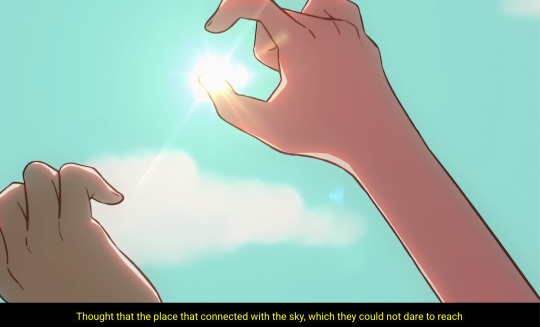

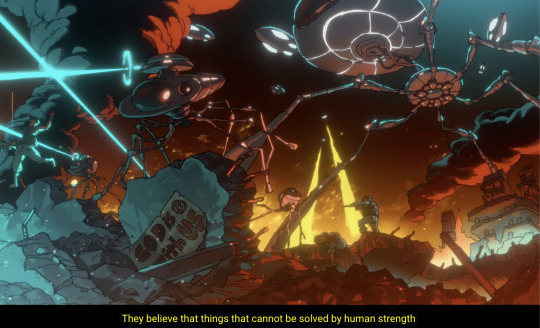
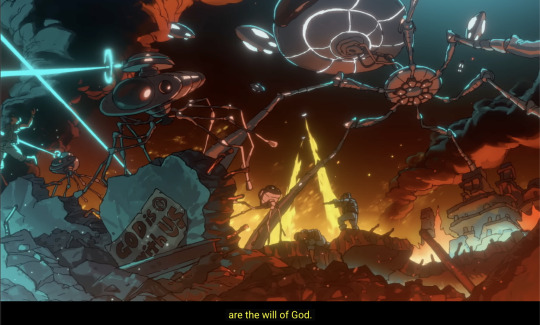
So the aliens make religion into a pacifying and exploitative tool to gain leverage on these human vulnerabilities. The "god" that exists in ALNST is the "Great anakt", it's a figure that represents Anakt Garden (and other affiliated organizations such as Anakt CO.), it's also a made-up figure by the aliens to represent Anakt Garden and serves as a way to control and brainwash pet humans into subservience.


Anakt garden is also its own significant topic, for one thing, its appearance is cartoonishly childlike and simplistic, meant to replicate the environment of Earth that humans are best suited to live in, it suits their needs too, but it's not at all realistic. The psychology behind establishing Anakt garden in this way, like an idealistic "heaven" (or heavenly garden) in which pet-humans flourish and are "born" as their voices are cultivated, and where pet-humans are laid to rest, and where they eventually return to in death. It sounds a lot like Heaven as we know it, right? That much inherently establishes that strengthened belief in god and that comfort, even though Anakt Garden is a painful place for pet humans too, they're meant to see Anakt Garden and the Great Anakt as safe havens


It works in the aliens' favor because, again, humans gravitate to the security of a god to follow, and most of them trust in the Great Anakt completely. Anakt garden is said to have a distinct cult-like environment. Pet humans are to sing with their hands clasped and praise, and it is reinforced even in basic training for formalities during singing. So, pet humans are taught to use their voices or "cries" to fulfill their purpose. Religion is made to mold humans into obedient performers who worship the craft, the figure that represents music rather than being human, which is mostly what religion in the real world was made for anyway, religion in alien stage only seeks to either distance humans from who they really are or make them so fragile and susceptible to manipulation that they fall for it




Without God, without something to truly believe in, humans who are aimless in this life, even under a shallow god, are just living in the system. It is no wonder that in Alien Stage, even those who sing with heart and passion are prioritized over those who simply drone over lyrics because they're doing what they're told. Because aliens made something that doesn't actually speak to humans like God does, the great anakt is a concept. That just speaks for their disconnect, but aliens love to see humans in their most passionate, whether loving, distraught, etc. And you only really see that in humans who aren't worshipping aliens' god, or in humans that are driven by other purposes, and that is enough to keep them driven

Religion and looking up to a god are also explored intricately through human relationships. Mizi, Till, Ivan, and Sua do not necessarily follow "God". But they do find faith in the love they have instead, which is the closest thing to a religion besides the literal thing. And that is what ignites true passion and freedom to live on and sing with life in them
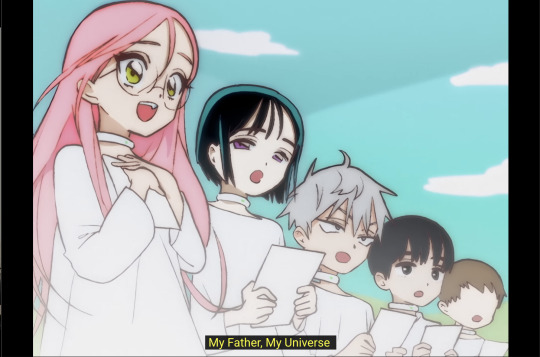
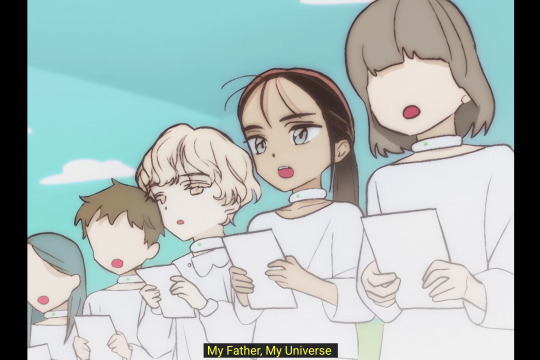
(Here comes a tiny analysis of sweet dreams) But Sweet Dream is incredibly theological, even though Sua sings knowing there is no god, she can't help but still wish for a force bigger than herself to save her, perhaps that is to speak for how humans are born in this hopeless situation, they know suffering, but religion or depending on someone is their only crutch, that's how the system is built to trap them

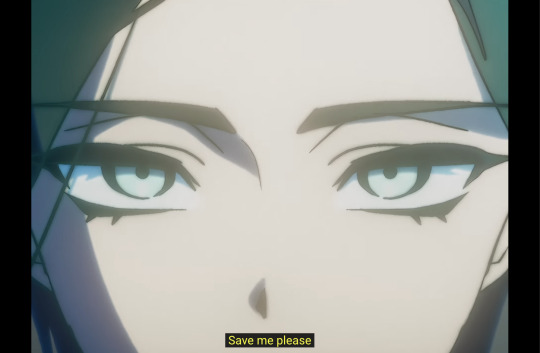

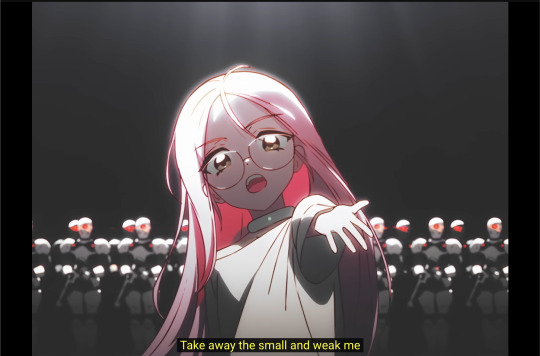
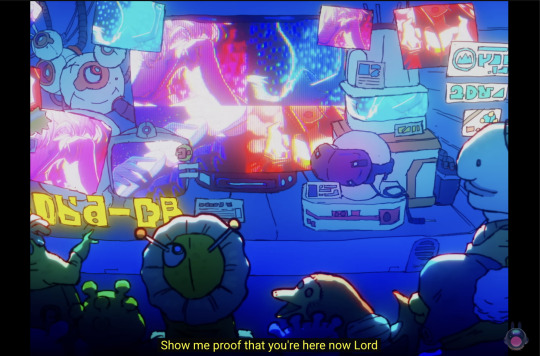
Finding a god in someone else also exists in this universe, despite the influence of the great Anakt; Mizi is the most apparent example. Mizi’s belief in god is surprisingly quite subjective (or not so surprising) because, in her eyes, according to what a god is, Sua must be her god! (which is a very romanticized way of seeing it in her case) The thing is, Mizi already recognizes herself as human, but in her monologue about religion, she directly answers the question of what a human can do in this universe, but believe, they choose to love, if believing in and loving god makes her human, than Sua was the greatest blessing to her, and therefore, she was her god before any great deity they knew.

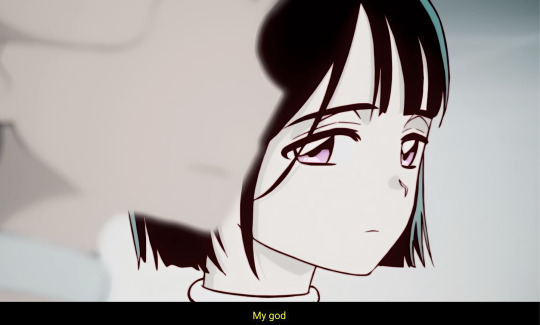
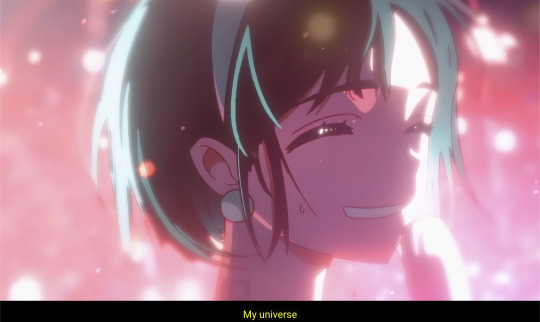
Till and HyunA are the last examples, not driven by religion, but by the passion of what they hold dear. Till and HyunA are the best parallels to each other because of their themes of reclaiming humanity and their right to their art and their agency, they're driven by love and passion for others, and creating art and music rather than just a god to follow. They're driven to create not because it's what the aliens want but because it's what they love to do, for others, for themselves, etc. It's entirely their own thing.


Who knows if they even vehemently disregard The Great Anakt,, but I think it's important that, because of how distant they are from those overarching themes of religion that Sua and Mizi's characters embrace, for example. The freer they are from those restraints and the deception, the more they rebel and fight back against the very system that seeks to tame and use them as products and entertainment, the freer they are to still embrace their humanity in a way that made them ungovernable by the aliens (And HyunA and Till are the biggest parallels for their avid rebellion too)
#damn this religious alien stage soup is so good...#fun fact i only really tolerate going to church so that i can make more connections to alien stage lore through theology and human study ts#alien stage#alnst#에이스테#alien stage till#alien stage hyuna#alien stage mizi#alien stage sua
39 notes
·
View notes